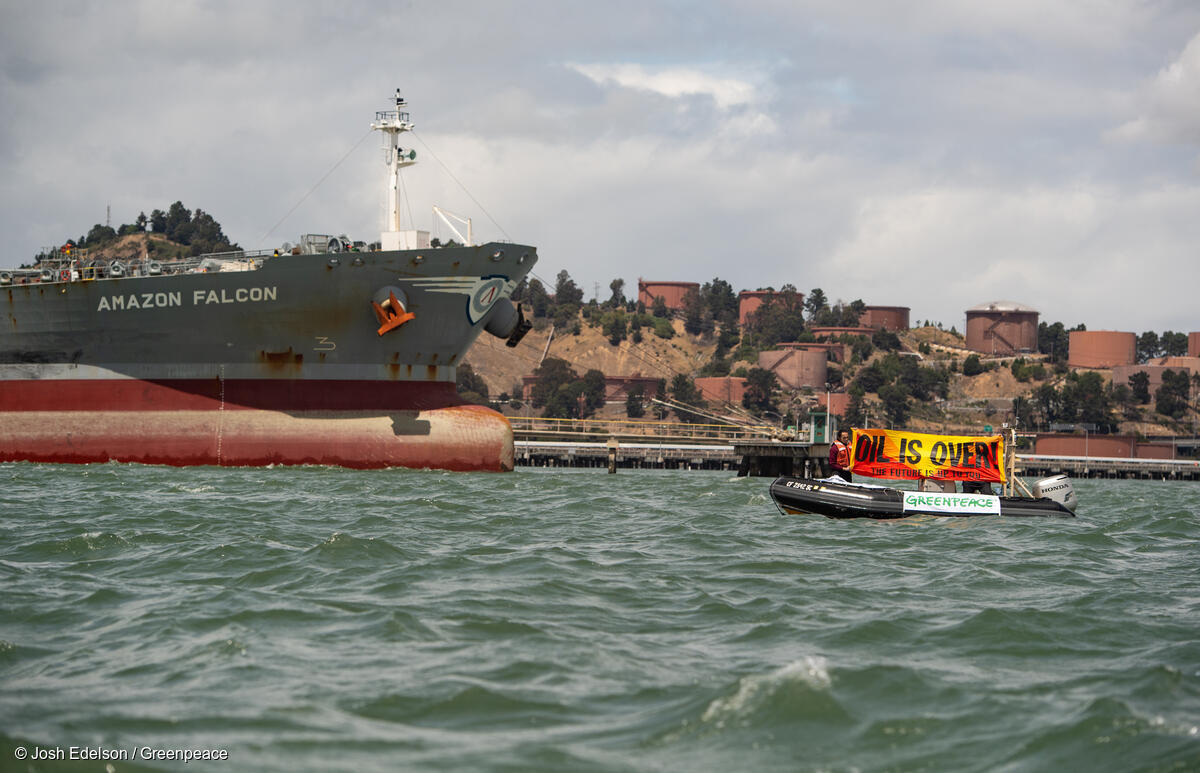San Francisco — Earlier today, Greenpeace USA activists sailed out on the San Francisco Bay with a message for Congress and the oil industry. The activists displayed a banner reading “Oil Is Over, The Future Is Up to You” next to the Amazon Falcon, one of dozens of crude oil tankers stuck off the California coast as the oil industry grinds to a halt. This action came hours after House Democrats introduced a new $3 trillion COVID-19 relief proposal [1] and as the oil industry unleashes a lobbying frenzy in hopes of securing taxpayer dollars to prop up its obsolete business model.
Photos are available here: https://media.greenpeace.org/
Greenpeace USA activist Harmony Lambert, part of the two-person crew that displayed the banner, said:
“The oil industry is reaching the end of the line. The West Coast has made it clear that we are finished with oil’s harmful effects on our communities, its violent legacy, and doomed future. The oil and gas industries have been polluting my traditional homelands ever since they came to California’s Central Coast, so I am here today to tell them they are no longer welcome in these waters. Indigenous, Black, and Brown communities will continue to resist the stranglehold this dangerous industry has on our health and livelihoods. A world beyond fossil fuels has never felt closer, but first we must stop oil CEOs from stealing our tax dollars to bail themselves out. Congress must ensure that all COVID-19 relief goes to workers and families on the frontlines of this crisis, not flailing oil corporations.”
As of April, there were nearly 40 oil tankers currently idling off the California coast, carrying a total of 20 million barrels of oil [2]. Even more have arrived in recent weeks. In spite of global oversupply, Governor Gavin Newsom’s administration recently approved 24 new fracking permits in the state after a nine-month pause. California communities from the Los Angeles region to the Bay Area have long been sites of contest between the oil industry and fenceline communities.
Darryl Molina Sarmiento, Executive Director of Communities for a Better Environment, said:
“Oil corporations such as Chevron are using the current economic crisis to perpetuate reliance on their heavily subsidized and deadly products while clean energy alternatives are readily available. Big Oil fears that frontline communities throughout California will rise up and demand an aggressive just transition towards rational, equitable, clean modes of producing and using energy. They want to silence the voice of youth, environmental justice communities, and progressive activists through their bought-and-paid-for politicians and their typical instruments of misinformation and oppression.”
Last week, Senator Jeff Merkley (D-OR) and Representative Nanette Barragan (D-CA-44) introduced the ReWIND Act [3], which would block Congressional Republicans’ multiple attempts to bail out the failing oil industry. The fossil fuel industry has already claimed $50 million in taxpayer dollars that it won’t have to pay back, and many of the companies that have accessed the Fed’s Main Street lending program have close ties to Trump [4]. But that’s just the tip of the iceberg in terms of what fossil fuel lobbyists have asked for.
Instead of a no-strings-attached bailout for the oil industry, Greenpeace USA has issued six policy priorities for Congress to consider when it reconvenes to negotiate additional stimulus measures next week. In a letter [5] sent on April 28, 2020, Greenpeace USA Executive Director Annie Leonard urged Congressional leadership to transform our country in response to the COVID-19 crisis rather than return to an economy dependent on exploitation and extraction.
ENDS
Notes:
[1] The HEROES Act provides funding for state, local, and tribal governments, additional resources for hospitals and COVID-19 testing, and another round of direct payments. But it fails to put restrictions in place that would close the fossil fuel industry loopholes in the last relief package. Nor does it provide the certainty that all relief will be steered to the frontlines of the crisis: https://docs.house.gov/
[2] https://www.latimes.com/
[4] https://www.theguardian.com/
[5] The letter and six policy priorities are available here: https://www.greenpeace.org/
Greenpeace is a global, independent campaigning organization that uses peaceful protest and creative communication to expose global environmental problems and promote solutions that are essential to a green and peaceful future.
Founded in 1978, Communities for a Better Environment is one of the preeminent environmental justice organizations in the nation. Its mission is to build people’s power in California’s communities of color and low-income communities to achieve environmental health and justice by preventing and reducing pollution and building green, healthy, and sustainable communities and environments.
Contact: Ryan Schleeter, Senior Communications Specialist, Greenpeace USA: +1 (415) 342-2386, [email protected]


